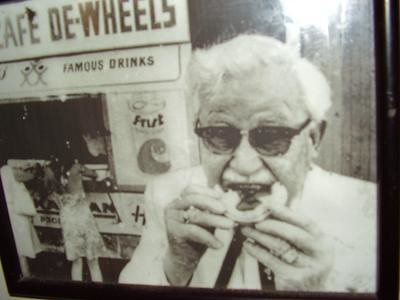 I've just heard back from the editor of a literary journal, and she actually liked the book review I wrote for them. Unless the editor has been inhaling at a Phish concert or is less honest than the Bush Administration, this is all very good. It also is a great burden off my chest, more symbolic than physical.
I've just heard back from the editor of a literary journal, and she actually liked the book review I wrote for them. Unless the editor has been inhaling at a Phish concert or is less honest than the Bush Administration, this is all very good. It also is a great burden off my chest, more symbolic than physical.
Because while I was flattered to be asked to write a book review, I was also terrified -- terrified that I wouldn't have anything to say, or what I turned in was about as profound as a Coors Light commercial.
(It was also fortunate that the editor, after giving me the assignment, didn't wake up the next morning and say, "You know, I really want to read that Bookfraud to see what kind of writer he really is.")
It's not that I lacked the discipline, talent, or intellectual bones to complete the assignment. It's not that I couldn't be bothered while Baby's diapers were soiled. Nor is it that I was scared I'd make a fool out of myself -- I've done that plenty of times already, and will have ample opportunity to humiliate my son by the mere fact of being myself.
It's that I dreaded I won't have anything original to say.
Kentucky Fried Critic
I didn't have much trouble coming up with an angle for my review, but I feared it would come across as lightweight, or, much worse, banal. The book in question has gotten tons of publicity already, and I figured my thoughts would be as interesting as what adventures awaited me at my local KFC.
I was asked in part because of my background, and the nature of the book I'm reviewing falls squarely into the territory (figuratively and literally) that I've written about in my fiction. And in working on the review, I noticed how much I actually drew upon my experience as a "novelist" to inform what I wrote.
So, unlike real life, things actually went to plan. I have to credit the journal's editors, who only made two demands of my work: 1)keep it under 1,500 words; and 2) no plot summary. The former removed my wont for verbal logorrhea, while the latter removed my wont to be lazy.
Not to imply that most book reviewers are lazy, but plot summary makes up about 87 percent of all the verbiage in The New York Times Book Review, for example. I used to think that TNYTBR (as us aficionados call it) was the pinnacle of American literary criticism -- the weekly magazine representing the most prominent voices in literature -- but now I know better.
In TNYTBR, friends review friends' books, while enemies settle scores. People are incendiary to establish a reputation; others kiss ass to make contacts. It's not that there isn't objective and perceptive criticism in the Times, but you gotta take much of what's written there with a grain of salt (which is why, despite her many shortcomings, Michiko Kakutani sets such a high standard -- she doesn't do the literary crowd thing and doesn't befriend writers. Smart woman that way.)
Living the (wet) dream
There was no danger of a conflict of interest in the review I wrote, which was of a novel by a writer living high in the fiction stratosphere. No, yours truly has not crossed paths with this person, and, given my low status in the literary caste, it's more likely that I will become bosom buddies with your local Klan Grand Wizard than with this person.
I guess this means that in some ways, being a loser is excellent. I've tried mightily to cultivate my loser-dom, so it's good to see my hard work pay off. Only in America, my son, only in America.
Monday, July 09, 2007
Review of a Review of a Review
Subscribe to:
Comment Feed (RSS)


|